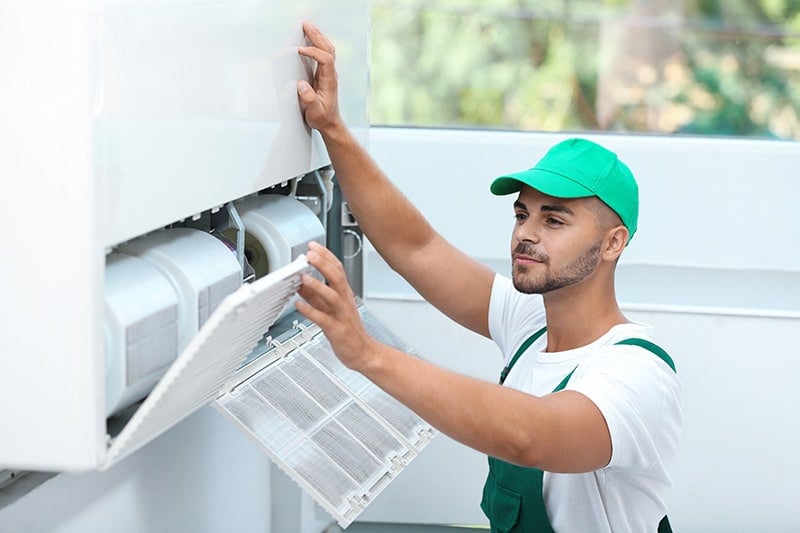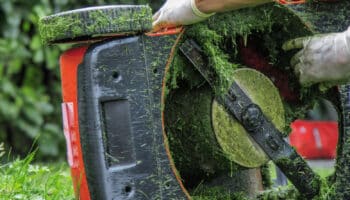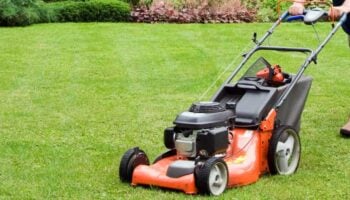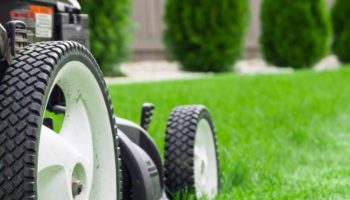A lawn mower that starts up and then quickly dies is quite a common problem.
So don’t worry – you’re not alone!
Many others face this problem and have found themselves on Google with their mower sitting out in the yard over the long grass.
In this article, we cover all of the main causes of this issue. The quick answer is that
If your lawn mower starts then dies, its gas may be bad, not enough oil, dirty carburetor, or bad spark plugs. If it’s an electric mower starting and dying, it may need more charge, be overheating, or have an electrical fault.
The answer depends on the type of mower and what specifically is happening. Since there are both gas and electric mowers that can start and die, there’s a good amount of detail to go into.
If you want to get this problem solved, then read on, and let’s breathe some life back into your lawn mower.
What Kind of Mower Do You Have?
Yes, it’s important to know what kind of mower you have to identify possible reasons why your lawn mower is starting and then quickly dying. Specifically, do you have a gas-powered or electric-powered mower? For example, if you have an electric mower, you don’t have to worry about bad gas being the problem.
Since gas mowers are the most common, let’s look at why your lawn mower may be cutting out on you.
Why Your Gas Mower Starts Then Dies
If your gas mower is starting and then shutting down, one thing you can say for sure is that a power cord isn’t the problem. No, when it comes to a gas-powered engine, you’re going to look at several things not seen on an electric-powered mower.
Old Gas
A key concern and common culprit with a gas lawn mower is how long it’s been stored and how old the gas within it is.
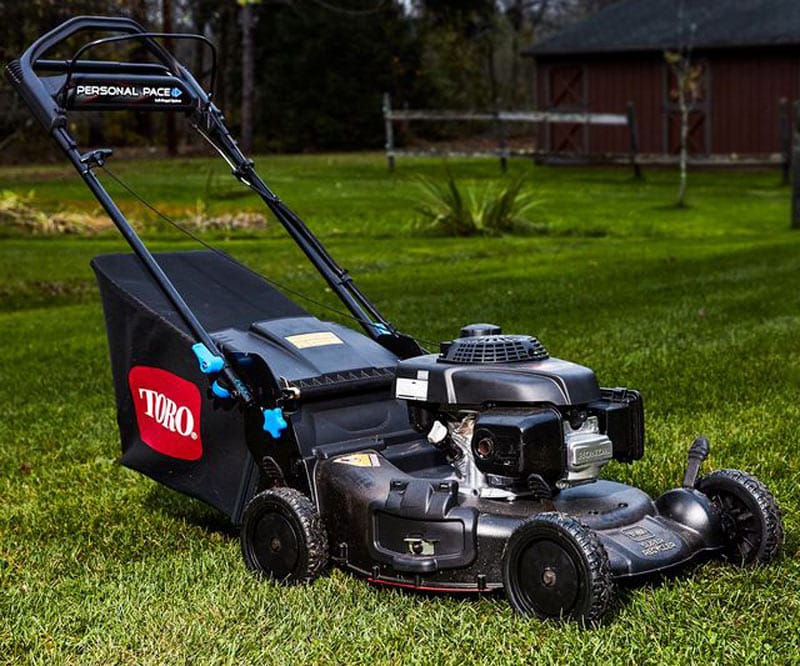
The reason this is a concern is the longer gas sits in a mower, and if the mower goes through a range of temperature changes in the surrounding environment, things like sludge and condensation can build up in the gas. The result of this can be poor to incomplete combustion.
Poor or incomplete combustion ends up with a mower that will die quicker than it runs.
To fix this, you can try adding new fuel, fuel stabilizer, or siphoning the gas out and refilling with a whole fresh tank.
Dirty Carburetor
Continuing with the theme of incomplete combustion, if the gasoline is good or new, then the next avenue to inspect is your mower’s carburetor.
If you’re wondering what the carburetor does or why it’s important, let’s retreat back to that whole incomplete combustion topic. There are two important requirements for a gasoline engine to run: gas and air.
You’ve already addressed the gasoline. Now you need to check the carburetor to ensure enough air is getting mixed with the fuel prior to combustion.
If the carburetor is the issue, then you’ll likely just need to do a good clean-out. Although there are several ways to do this, it’s recommended to follow your manufacturer’s guidance for your specific mower. That being said, cleaning a carburetor usually always involves pressurized air and a cleaner that gets the gunk out.
Bad Spark Plugs
Yes, more talk about issues with combustion. Already addressed the gas and the gas/air mixture needed for combustion. Now let’s get to the actual possible problem with making that tiny explosion within the engine that is converted into power (or makes the mower work).
In this case, you may have a bad spark plug. If you don’t know what a spark plug does, it basically provides the spark that allows for the combustion of the gas/air mixture. It creates the BANG!
If you’ve got no spark, you won’t have a running engine. If you’ve got a weak spark, you may have an engine that starts but then dies.
The solution is to replace the spark plug.
Trust Your Dip Stick
Time to talk about oil. Or rather, time to talk about how much oil you may be putting in your mower. If you’re overfilling your mower, you could be hurting more than helping.
Yes, it’s tempting to want to put more oil in. After all, oil acts as protection for all those rotating parts.
But, there is a limit to how much oil you can put in before the mower becomes too full. If there’s more oil than places for it to travel, you’ll essentially lock up or freeze your mower’s engine. Also, because it’s a pressurized system, overfilling can lead to blown gaskets and leaks.
So, in accordance with what your manufacturer’s manual states, fill as required, not based on personal feelings. You can find your lawnmower’s manual right below.
If All of Those Fail
If any of the above fixes fail to correct your mower problem, it may be time to call for help from a technician or service center. The reason, at this point, is you’re probably dealing with a more complicated problem that could range from a bad carburetor to issues with your entire fuel system.
Why Your Electric Mower Starts Then Dies
There are several things that may cause your electric mower to stop after starting. Below, you’ll find the most common issues and what you can do to fix the problem.
Your Electric Mower’s Battery Doesn’t Have a Sufficient Charge
This one only applies to battery-operated mowers, of course. And yes, you’d think this is the first thing you’d check but the trick here is that often a battery may still show a charge and not be completely dead. Depending on the electric mower, though, if the mower doesn’t sense there’s enough charge to keep going, it’ll shut down automatically as a safety feature.
The fix here is to remove the battery and charge it or switch it out with a battery that’s already charged.
If your battery doesn’t charge or maintain a charge as it should, then it may have reached the end of its service life. In this case, it’s time to replace it and move on.
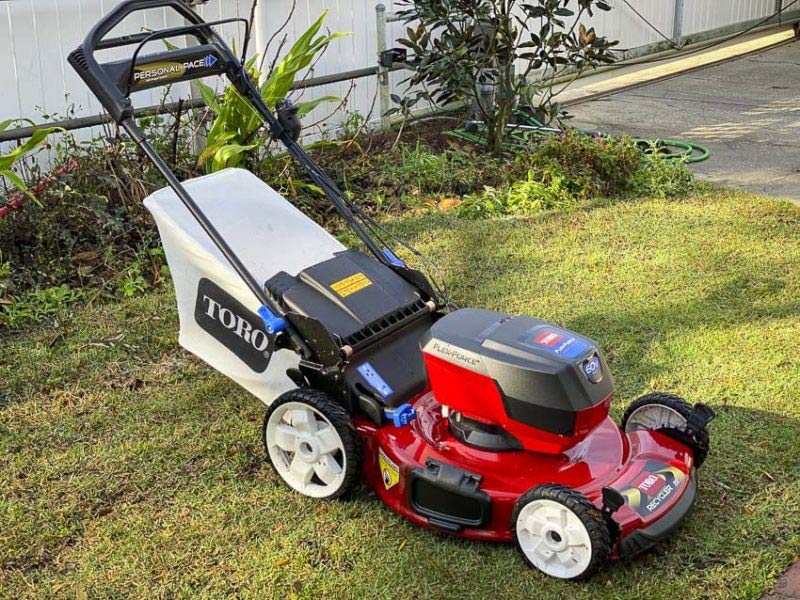
Your Electric Mower is Overheating
This one you might not consider your mower is overheating right off the bat. After all, you were barely able to run it. How can overheating be the reason it’s shutting down.
Well, in this case, you need to take into account the climate you may be dealing with and where you store your mower. If you live in a place that gets hot and humid, your mower is probably more than hot before putting it to work.
If you live in such an area and you store your electric mower in a place that gets hotter than the air outside, your mower might already be in an overheating situation before you run it for long.
In either or both cases, try to mow in the morning or late afternoon when it’s somewhat cooler. Let your mower at least acclimatize to the outside air for a while after pulling it out of the garage or shed. Letting it sit in a nice breeze can do wonders.
Now, if your electric mower does run for a while and then overheats and shuts down, you may have clogged vents. Inspect them and clean them out if they’re clogged up or obstructed with lawn debris. Clogged vents are a good way to see your motor overheat, which will almost always lead to a shutdown.
Your Mowing Height is Too Low
The good thing here is a power problem or a motor problem. You’ve simply got the mower height set too low and you’re essentially tasking your mower with more volume than it can handle. As a result, the mower shuts down similar to a gas engine stalling out.
The solution is as simple as raising your mowing height and not overloading the motor.
Grass and Debris is Collecting Under Your Mower
A quick visual inspection should let you know if this is an issue within a few seconds.
Take a look under the mower (after you secure your power cord or battery). Are there large chunks of matted clippings or dirt or both? Any branches that could be preventing your blades from rotating efficiently or rotating at all?
If the answer is yes, clean out whatever’s preventing normal blade rotation and get back to work.
Electrical System
Here, you’re just going to have to do a good visual inspection of your electrical cabling, checking for damage, cuts, and loose connections. If you have a corded mower, inspect your power cord as well.
Lastly, check the breakers on your mower if you have any and reset them if they’ve tripped.
Your Motor May Be Failing
This is the worst-case scenario but shouldn’t be considered until the other tips above have been exhausted. If none of those correct your mowing issue, then it may be time to call a service center and consider the possibility of having to repair or replace the motor.
If you want to get any replacement part – or see how much one would cost – click to enter your model number in the search bar below. Our partners at AppliancePartsPros stock almost every part with free guides on how to install them.

Conclusion
Lawnmowers should run when they’re expected to. But like a lot of technology, it doesn’t always happen the way you want every time. That being said, the causes of an immature mower shutdown are often common and easily correctable.
The main thing is to know your mower and what your manufacturer recommends as far as troubleshooting for your design and to not jump to the worst case scenario without exhausting those recommendations.


